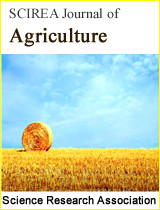Non destructive method of estimation for green mass of prickly pear
DOI: 232 Downloads 14375 Views
Author(s)
Abstract
In the present study aimed to evaluate the use of metric variables as non-destructive method for estimating the green mass of prickly pear in semi-arid environment. The correlation between the weight of green mass, volume and real volume estimated by the variables of length, width and thickness of the cladodes was investigated in 500 cladodes of prickly pear, variety IPA20. The cladodes were collected in five different size classes (length). The coefficient of determination for the variables of weight and volume of real (0.922) confirmed the correlation between variables. The determination coefficients for the variables of weight and volume were estimated 0.922, 0.94, 0.971, 0.864, 0.889 and 0.982 for classes A, B, C, D, E and all classes together respectively. Except for class B, which also showed significant, high correlation was observed between the variables tested. Thus, we conclude that the use of tape and the caliper can be important tools in the estimation of green mass production of cactus pear.
Keywords
Archimedes Law; estimator; non destructive method; animal nutrition
Cite this paper
Érico de Sá Petit Lobão, Alberício Pereira de Andrade, Tiago Ferreira Pinto, Ivan de Oliveira Lima Júnior, Valéria Araújo,
Non destructive method of estimation for green mass of prickly pear
, SCIREA Journal of Agriculture.
Volume 4, Issue 3, June 2019 | PP. 35-39.
References
| [ 1 ] | BIANCO, S.; PITELLI, R.A.; PERECIN, D. Estimativa da área foliar de Panicum maximum usando dimensões lineares do limbo foliar. Planta Daninha, Viçosa-MG, v.19, n.2, p.217 – 221, 2001. |
| [ 2 ] | COSTA, B.M.; LEDO, C.A.S.; SILVA, M.C.; TEIXEIRA, V.I. Estimativa da produção de forragem em pastagem de Brachiaria decumbens. Arch. Zootec. v.58, n.221, p.141 – 144, 2009. |
| [ 3 ] | HARVEY, W.R. Least squares analysis of data with unequal suclass numbers. Beltsville, Md: ARS/USDA, Publ. 1960. |
| [ 4 ] | RAYMOND, M.; ROUSSET, F. GENEPOP (version 1.2): a population genetics software for exact tests and ecumeinism. Journal of Heredity. v.86, p.248 – 249, 1995. |
| [ 5 ] | TORRES, R.A.; BERGMANN, J.A.G.; COSTA, C.N.; PEREIRA, C.S.; VALENTE, J.; PENNA, V.N.; TORRES-FILHO, R.A.; ARAÚJO, C.V. Efeito da heterogeneidade de variância na avaliação genética de bovinos da raça Holandesa no Brasil. Revista Brasileira de Zootecnia. v.29, n.4, p.1050 – 1059, 2000. |
| [ 6 ] | VERAS, R.M.L., FERREIRA, M.A., CARVALHO, F.F.R., VERAS, A.S.C. Farelo de Palma Forrageira (Opuntia ficus-indica Mill) em Substituição ao Milho. 1. Digestibilidade Aparente de Nutrientes. Revista Brasileira de Zootecnia. v.31, n.3, p.1302 – 1306, 2002. |

